
Lisa Grossman is the astronomy writer for Science News. Previously she was a news editor at New Scientist, where she ran the physical sciences section of the magazine for three years. Before that, she spent three years at New Scientist as a reporter, covering space, physics and astronomy. She has a degree in astronomy from Cornell University and a graduate certificate in science writing from UC Santa Cruz. Lisa was a finalist for the AGU David Perlman Award for Excellence in Science Journalism, and received the Institute of Physics/Science and Technology Facilities Council physics writing award and the AAS Solar Physics Division Popular Writing Award. She interned at Science News in 2009-2010.

Trustworthy journalism comes at a price.
Scientists and journalists share a core belief in questioning, observing and verifying to reach the truth. Science News reports on crucial research and discovery across science disciplines. We need your financial support to make it happen – every contribution makes a difference.
All Stories by Lisa Grossman
-
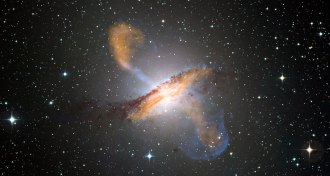 Cosmology
CosmologyThe way dwarf galaxies move puts a new spin on galaxy formation
Distant dwarf galaxies orbit a larger galaxy in a coordinated loop, rather than randomly as expected. The finding could challenge theories of dark matter.
-
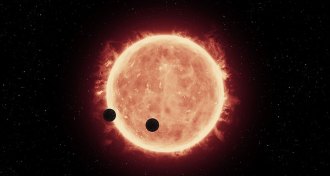 Astronomy
AstronomySome of TRAPPIST-1’s planets could have life-friendly atmospheres
The seven planets orbiting TRAPPIST-1 are probably rocky and some may have life-friendly atmospheres, two new papers suggest.
-
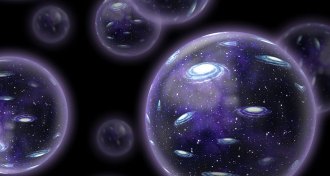 Astronomy
AstronomyUniverses with no weak force might still have stars and life
An alternate universe that lacks one of the four fundamental forces might still have galaxies, stars, planets and perhaps life, a new study suggests.
-
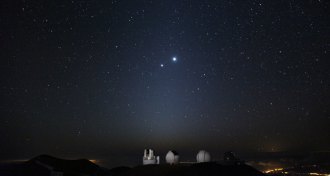 Astronomy
AstronomyStars with too much lithium may have stolen it
Some small stars have extra lithium before they grow old, suggesting they get extra amounts of the element from an external source.
-
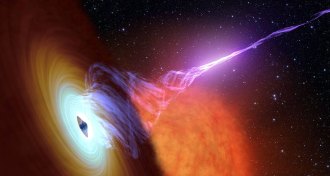 Astronomy
AstronomyMysterious high-energy particles could come from black hole jets
Three types of high-energy cosmic particles could all have the same source: black holes in galaxy clusters.
-
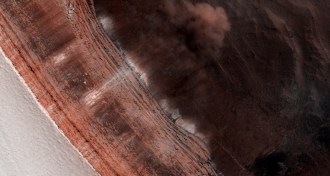 Planetary Science
Planetary ScienceShallow ice sheets discovered on Mars could aid future astronauts
Exposed water ice on steep Martian slopes suggest there’s a lot within a meter or two of the surface.
-
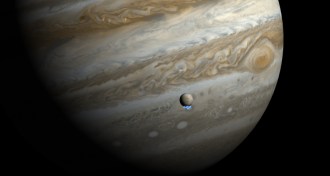 Planetary Science
Planetary ScienceHubble telescope ramps up search for Europa’s watery plumes
Astronomers are redoubling their efforts to confirm that the icy moon Europa spews water from its south pole.
-
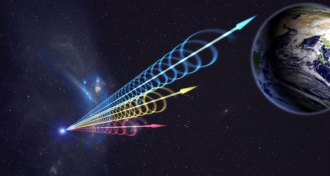 Astronomy
AstronomyFast radio bursts may be from a neutron star orbiting a black hole
A repeating fast radio burst has twisted waves, suggesting its home has an unusually strong magnetic field.
-
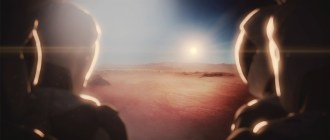 Planetary Science
Planetary ScienceHow to keep humans from ruining the search for life on Mars
As the race to put humans on Mars heats up, researchers worry they are running out of time to find life on the Red planet.
-
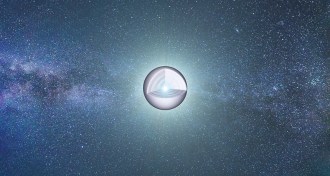 Astronomy
AstronomyWhite dwarf’s inner makeup is mapped for the first time
The first map of the internal composition of a white dwarf star shows these stellar corpses contain more oxygen than expected, challenging stellar evolution theories.
-
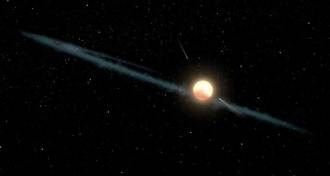 Astronomy
AstronomyAliens ruled out for why Tabby’s star flickers
The first real-time observations of Tabby’s star flickering put the final nail in the “alien megastructure” coffin.
-
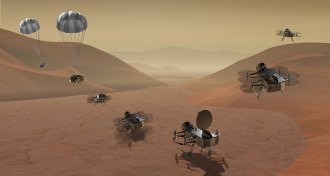 Astronomy
AstronomyNASA’s next stop will be Titan or a comet
The finalists for NASA’s next solar system mission aim to send a drone to Saturn’s largest moon or to return samples from a comet.